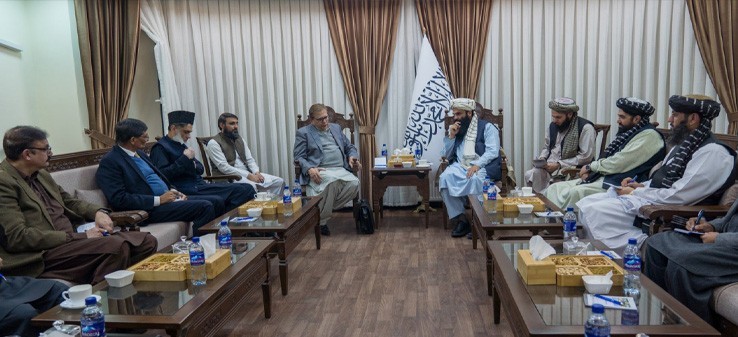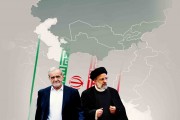The Nature and Reasons for Pakistan’s Dual Policy Towards the Taliban Government
Relations between Taliban-led Afghanistan and Pakistan have been largely tense over the past three years. Recently, Pakistan’s civilian leadership appeared to recognize the strategic and economic costs of continued tensions and sought to recalibrate its approach toward Afghanistan. It seemed that they aimed to remove tensions from bilateral relations, in order to secure economic, political, and security interests, reclaim their role in Afghanistan, and prevent the influence of rival states in the country as much as possible. However, the meaningful action taken by the Pakistan military in attacking Afghanistan amidst negotiations by Pakistan’s special envoy in Kabul disrupted the course of developments.
By: Abbas Fayyaz
What you will read in this report
What you will read in this report
*Introduction
*Evidence Indicating a Shift in Pakistan’s Policy
*The Pakistan government's Reasons for the Need for Change in Pakistan Policy
*Why the Pakistan Military Moves Against the Government's Direction?
*Conclusion
*Evidence Indicating a Shift in Pakistan’s Policy
*The Pakistan government's Reasons for the Need for Change in Pakistan Policy
*Why the Pakistan Military Moves Against the Government's Direction?
*Conclusion
Introduction
In the summer of 2021, when the Taliban surprisingly captured Kabul with relative ease, Pakistanis should have been the happiest neighbor of Afghanistan. Many experts on Afghanistan, and at least the Pakistanis themselves, believed that in addition to the Taliban, Pakistan was also the victor in this twenty-year battle. Pakistan had supported the Taliban for two decades without hesitation and had utilized all its resources to help the Taliban first against the Mujahideen government and later against the Western-backed republics to achieve its long-term goals in Afghanistan. However, the invalidity of this assumption quickly became evident, and Taliban-Pakistan relations faced tensions shortly after the Taliban’s victory and establishment in Kabul.
Some analysts, including this author, had believed even a year or two before the Taliban's victory that, contrary to the common belief, the Taliban would face problems with Pakistan and that their relationship could not proceed smoothly or satisfactorily—especially for Pakistan. This opinion had some reasons, the main of which were related to Pakistan, including Pakistan's paternalistic view of the Taliban, and its expectation that the Taliban should respect Pakistan’s decades-long support and reciprocate by complying with Pakistan’s demands. These demands included severing ties with the Tahreek-e- Pakistani Taliban (TTP), compromising on the Durand Line issue or at least not escalating it, allowing Pakistan unhindered access to Afghanistan’s water resources, and preventing India from re-establishing its presence in Afghanistan.
But there were also motives on the Afghan Taliban side that even caused this group to incite or welcome tensions at times. First of all, Taliban leadership was determined to demonstrate its independence from Pakistan, as years of Pakistani support had left a mark on its reputation. Other factors included asserting power, reclaiming identity, showcasing autonomy, and adhering to certain Pashtunwali and ideological principles by supporting their Pakistani counterpart— TTP. Additionally, they sought to convey to Pakistan that the era of Pakistan's dominance was over. The Taliban also seemed to attempt to boost national pride and public support by confronting an unpopular neighbor in the eyes of many Afghans.
This dynamic sometimes led to severe threats from both sides. For example, Pakistan’s army commander once stated that a military attack on Afghanistan was a viable option. The latest examples of such tensions include Pakistan’s mass expulsion of Afghan refugees and its airstrike on Afghanistan, which prompted a reaction from the Taliban government.
Evidence Indicating a Shift in Pakistan’s Policy
It is no secret that Pakistan’s policy over the past three years has not only failed to secure its interests but has also caused political, security, and economic damage due to the Taliban’s insistence on its positions against Pakistan and even the Taliban government's support or tolerance of TTP activities.
However, since late November 2024, signs in the behavior and statements of both parties, particularly Pakistan, indicated a shift in Pakistani rulers’ approach towards Afghanistan. The Taliban also seemed receptive to this change. Below are some of the developments that suggest Pakistani policymakers were inclined to modify their approach towards the Taliban and the Taliban’s willingness to accept it:
One report stated that on November 27, 2024, Mohammad Yaqub Mujahid, the Taliban’s acting defense minister, told Pakistan’s ambassador in Kabul,Ubaid Ur Rahman Nizamani, that the Taliban government was ready for comprehensive cooperation with Pakistan in various fields.
Another report indicated that families of TTP members would be relocated from Nangarhar to Kabul and northern provinces—suggesting that the Taliban were yielding to Pakistan’s demands. According to this report, families of TTP members from districts such as Shinwar, Ghani Khel, Kot, Batikot, Momand Dara, and Ghoshta in Nangarhar were being transferred to Kabul and northern provinces. This move reportedly followed the killing of several Pakistani Taliban commanders in Kunar, including Umar Bajaur, a senior TTP leader.
Additionally, social media reports claimed that the Taliban, in coordination with Pakistan intelligence, had relocated some TTP families from Afghanistan’s border areas to Ghazni province. However, Taliban local officials in Nangarhar declined to comment, and in Pakistan, Foreign Ministry spokesperson Mumtaz Zahra Baloch did not provide a clear response when asked about these reports. Moreover, Pakistani politicians, who previously threatened and warned the Taliban, started advocating for resolving issues through dialogue.
For instance, Mumtaz Zahra Baloch stated in a press conference that Islamabad was committed to continued engagement and dialogue with the Taliban on unresolved issues. She emphasized that recent meetings between Pakistani and Taliban officials indicated efforts to strengthen bilateral relations and address outstanding concerns. She added, “These meetings reflect Pakistan’s willingness to use dialogue for resolving ongoing issues, and present a constructive approach to finding appropriate solutions, particularly regarding matters that have caused serious concerns for Pakistan.”
Similarly, the Chief Minister of Khyber Pakhtunkhwa called for negotiations with the Taliban, stating, “Dialogue with the caretaker government in Afghanistan is the only way to maintain peace and security in the region.” He argued that if the world recognizes the Taliban, Pakistan should also engage in dialogue with them for the sake of regional stability. Ghandapur, a member of the opposition Pakistan Tehreek-e-Insaf (PTI) party, urged Islamabad to take practical steps in this regard and negotiate with the Taliban.
Furthermore, reports emerged about agreements between Afghanistan and Pakistan to facilitate trade and transit, as confirmed by Pakistan’s chargé d'affaires in Kabul. Another notable development was the reappointment of Mohammad Sadiq as Pakistan’s special envoy to Afghanistan—a role he previously held under Imran Khan’s government. Notably, Taliban-Pakistan tensions escalated after Imran Khan’s ouster.
Pakistan newspapers also reported on improving relations between Islamabad and the Taliban, highlighting the foreign minister’s meeting with the Taliban’s chargé d'affaires and the Pakistan ambassador’s meeting with the Taliban’s defense minister as signs of this improvement.
| However, just as these reports suggested an imminent shift in Pakistan’s Afghanistan policy, and while Mohammad Sadiq was in Kabul for negotiations, the Pakistani Air Force launched an attack on Bermal district in Paktia province, killing and injuring dozens. This attack prompted the Taliban government to cut negotiations short and send Sadiq back to Pakistan. This incident once again demonstrated the lack of consensus in Pakistan’s approach to Afghanistan: while the Pakistan government was keen on improving relations, the military’s airstrike—coinciding with Pakistan envoy’s presence in Kabul—indicated the army’s discontent with this trend. |
The following sections will explore what the Pakistan government and its supporters aim to achieve by improving ties with the Taliban, as well as the military’s motives behind its actions.
The Pakistan Government's Reasons for the Need for Change in Pakistan Policy
By examining the news and analyzing the Pakistan government's approach towards Afghanistan, it becomes evident that a shift has occurred in the mindset of Pakistan’s leadership regarding its dealings with the Taliban. This shift aims to create a peaceful environment in bilateral relations, and achieve the desired goals through negotiations and seeking the views of the other side. Below, we will outline the factors that led to this transformation in Pakistan’s thinking and the reasons behind it:
A. Security
Pakistan believed that with the Taliban's rise to power in Afghanistan, factors such as Taliban historical cooperation with Islamabad, their ideological similarities with Pakistan’s religious groups, and their moral indebtedness to Pakistan due to years of assistance, would undoubtedly result in extensive collaboration between the two sides, including in security matters. Pakistan expected that the Afghan Taliban would help it curb insecurity caused by various militant groups—or at least a part of them, specifically TTP. However, this assumption quickly proved false, and Pakistan found itself in a situation similar to what it had historically created for different Afghan governments by supporting the Mujahideen and later the Afghan Taliban.
Contrary to Pakistan’s expectations, the Afghan Taliban did not assist in countering TTP. On the contrary, they seemingly supported TTP or, at the very least, turned a blind eye to their activities against Pakistan, allowing them to use Afghan soil for operations.
This situation emboldened TTP, which now had a strategic depth extending into Afghanistan. Consequently, terrorist activities increased significantly. The level of insecurity in Pakistan rose to the extent that even the Pakistani military, security forces, and foreign nationals—including Chinese engineers and workers—came under frequent attacks. For a country grappling with an economic crisis, this level of insecurity was both distressing and exacerbated its economic hardships, as well as disrupting China's economic activities—Pakistan’s key economic partner—in major projects. The deteriorating security situation forced China to reduce its presence and demand a joint security mechanism to protect its citizens. The economic and reputational damages from this scenario imposed heavy costs on Pakistan, further aggravating its already severe economic crisis.
B. Economy
Beyond the impact of insecurity on Pakistan’s economy, the deterioration of Afghanistan-Pakistan relations had direct and destructive economic consequences. In this context, Bilateral trade plummeted, causing Pakistan, which had been Afghanistan’s top trading partner for years, to lose its market share to other economic partners, including Iran.
Another significant issue affected by strained relations was Pakistan’s long-standing aspiration to connect with Central Asia via Afghanistan. Clearly, under conditions of strained relations and security challenges, such plans were neither feasible nor practical.
Additionally, Pakistan was keenly interested in energy transfers from Central Asian countries, as the energy-strapped nation desperately needed these resources. Electricity and gas transmission projects from Central Asia to Pakistan required stable and balanced relations between Afghanistan and Pakistan. In a tense environment, these initiatives could not be pursued or implemented. Given that these projects are crucial for Pakistan’s energy security, their stagnation posed a major challenge.
C. Politics
*Pakistan’s Reassessment of Its Role in Afghanistan
Politically, Pakistan has played an extensive role in Afghanistan and exerted significant influence in the country for over 40 years. This role and influence has been so great that many Afghans have come to believe that Pakistan could derail any political process that went against its interests in Afghanistan. However, following the Taliban’s victory, factions defeated by the Taliban—many of whom had once benefited from Pakistan’s support—developed animosity towards Pakistan, believing that Islamabad had once again installed its proxy (the Taliban) in power. As a result, Pakistan lost its traditional leverage over these factions, which had now become either ineffective opposition or, at best, marginally influential actors.
The Taliban, for the aforementioned reasons, also did not maintain good relations with Pakistan. Furthermore, there was no third political force that Pakistan could rely on, or cultivate as an alternative, to counter the Taliban.
In this situation, Pakistan found itself in a dilemma—it had lost both its influence over the ruling power and any effective opposition group. When a key player in a political scenario has no control over either the ruling power or its opposition, its ability to shape the outcome is significantly diminished. Now, Pakistan is striving to regain its traditional role in Afghanistan. The extent of its success depends on Pakistan’s diplomatic finesse and how the Taliban respond to these efforts.
*Preventing New Conflicts Such as Border and Water Disputes
Pakistan is a country with a weak economy, numerous challenges, political instability, and a powerful neighbor—India—that could quickly become a serious and active adversary. Additionally, Pakistan inherits the problems left over from its imperfect birth. As one analyst put it, Pakistan was created as a quasi-state in the subcontinent, struggling with state-building, national integration, effective use of religion, and crisis management.
Under these circumstances, Pakistan cannot afford to create another crisis, such as Afghanistan’s claim over the Durand Line or Kabul’s potential restrictions on Pakistan’s access to cross-border water resources. Preventing such crises requires a peaceful and mutually beneficial relationship between the two countries. In a tense atmosphere, any of these issues could become a leverage tool for the Taliban against Pakistan. Recognizing this, Pakistan policymakers concluded that altering the nature of bilateral relations was essential.
*China’s Role and Interests in Both Countries
China, Pakistan’s largest economic partner, has been seeking extensive economic opportunities in Afghanistan since the Taliban took power. Beijing has proposed multiple initiatives to advance its economic agenda, and stands to gain the most from friendly Afghanistan-Pakistan relations, reduced tensions, and increased stability, which would create vast economic opportunities.
For this reason, as reported by the media and some Pakistani officials, China has played a role in improving relations between the two countries. As a key stakeholder with interests in both Pakistan and Afghanistan, China’s mediation efforts initially appeared to yield positive results. However, recent military actions by Pakistan have at least temporarily disrupted these efforts.
Pakistan Defense Minister Khawaja Muhammad Asif, in an interview, hinted at these efforts without directly naming China or any other country. He stated that attempts to de-escalate tensions between Pakistan and Afghanistan interim government were ongoing. He also mentioned that countries maintaining good relations with both Pakistan and Afghanistan were working towards normalizing ties between Islamabad and Kabul as neighboring countries.
Clearly, resolving the current tensions between Afghanistan and Pakistan not only benefits both nations but also serves China’s significant interests in the region. Moreover, it enhances China’s stature as a regional power capable of conflict resolution and diplomatic mediation.
The Pakistan Government's Reasons for the Need for Change in Pakistan Policy
By examining the news and analyzing the Pakistan government's approach towards Afghanistan, it becomes evident that a shift has occurred in the mindset of Pakistan’s leadership regarding its dealings with the Taliban. This shift aims to create a peaceful environment in bilateral relations, and achieve the desired goals through negotiations and seeking the views of the other side. Below, we will outline the factors that led to this transformation in Pakistan’s thinking and the reasons behind it:
A. Security
Pakistan believed that with the Taliban's rise to power in Afghanistan, factors such as Taliban historical cooperation with Islamabad, their ideological similarities with Pakistan’s religious groups, and their moral indebtedness to Pakistan due to years of assistance, would undoubtedly result in extensive collaboration between the two sides, including in security matters. Pakistan expected that the Afghan Taliban would help it curb insecurity caused by various militant groups—or at least a part of them, specifically TTP. However, this assumption quickly proved false, and Pakistan found itself in a situation similar to what it had historically created for different Afghan governments by supporting the Mujahideen and later the Afghan Taliban.
Contrary to Pakistan’s expectations, the Afghan Taliban did not assist in countering TTP. On the contrary, they seemingly supported TTP or, at the very least, turned a blind eye to their activities against Pakistan, allowing them to use Afghan soil for operations.
This situation emboldened TTP, which now had a strategic depth extending into Afghanistan. Consequently, terrorist activities increased significantly. The level of insecurity in Pakistan rose to the extent that even the Pakistani military, security forces, and foreign nationals—including Chinese engineers and workers—came under frequent attacks. For a country grappling with an economic crisis, this level of insecurity was both distressing and exacerbated its economic hardships, as well as disrupting China's economic activities—Pakistan’s key economic partner—in major projects. The deteriorating security situation forced China to reduce its presence and demand a joint security mechanism to protect its citizens. The economic and reputational damages from this scenario imposed heavy costs on Pakistan, further aggravating its already severe economic crisis.
B. Economy
Beyond the impact of insecurity on Pakistan’s economy, the deterioration of Afghanistan-Pakistan relations had direct and destructive economic consequences. In this context, Bilateral trade plummeted, causing Pakistan, which had been Afghanistan’s top trading partner for years, to lose its market share to other economic partners, including Iran.
Another significant issue affected by strained relations was Pakistan’s long-standing aspiration to connect with Central Asia via Afghanistan. Clearly, under conditions of strained relations and security challenges, such plans were neither feasible nor practical.
Additionally, Pakistan was keenly interested in energy transfers from Central Asian countries, as the energy-strapped nation desperately needed these resources. Electricity and gas transmission projects from Central Asia to Pakistan required stable and balanced relations between Afghanistan and Pakistan. In a tense environment, these initiatives could not be pursued or implemented. Given that these projects are crucial for Pakistan’s energy security, their stagnation posed a major challenge.
C. Politics
*Pakistan’s Reassessment of Its Role in Afghanistan
Politically, Pakistan has played an extensive role in Afghanistan and exerted significant influence in the country for over 40 years. This role and influence has been so great that many Afghans have come to believe that Pakistan could derail any political process that went against its interests in Afghanistan. However, following the Taliban’s victory, factions defeated by the Taliban—many of whom had once benefited from Pakistan’s support—developed animosity towards Pakistan, believing that Islamabad had once again installed its proxy (the Taliban) in power. As a result, Pakistan lost its traditional leverage over these factions, which had now become either ineffective opposition or, at best, marginally influential actors.
The Taliban, for the aforementioned reasons, also did not maintain good relations with Pakistan. Furthermore, there was no third political force that Pakistan could rely on, or cultivate as an alternative, to counter the Taliban.
In this situation, Pakistan found itself in a dilemma—it had lost both its influence over the ruling power and any effective opposition group. When a key player in a political scenario has no control over either the ruling power or its opposition, its ability to shape the outcome is significantly diminished. Now, Pakistan is striving to regain its traditional role in Afghanistan. The extent of its success depends on Pakistan’s diplomatic finesse and how the Taliban respond to these efforts.
*Preventing New Conflicts Such as Border and Water Disputes
Pakistan is a country with a weak economy, numerous challenges, political instability, and a powerful neighbor—India—that could quickly become a serious and active adversary. Additionally, Pakistan inherits the problems left over from its imperfect birth. As one analyst put it, Pakistan was created as a quasi-state in the subcontinent, struggling with state-building, national integration, effective use of religion, and crisis management.
Under these circumstances, Pakistan cannot afford to create another crisis, such as Afghanistan’s claim over the Durand Line or Kabul’s potential restrictions on Pakistan’s access to cross-border water resources. Preventing such crises requires a peaceful and mutually beneficial relationship between the two countries. In a tense atmosphere, any of these issues could become a leverage tool for the Taliban against Pakistan. Recognizing this, Pakistan policymakers concluded that altering the nature of bilateral relations was essential.
*China’s Role and Interests in Both Countries
China, Pakistan’s largest economic partner, has been seeking extensive economic opportunities in Afghanistan since the Taliban took power. Beijing has proposed multiple initiatives to advance its economic agenda, and stands to gain the most from friendly Afghanistan-Pakistan relations, reduced tensions, and increased stability, which would create vast economic opportunities.
For this reason, as reported by the media and some Pakistani officials, China has played a role in improving relations between the two countries. As a key stakeholder with interests in both Pakistan and Afghanistan, China’s mediation efforts initially appeared to yield positive results. However, recent military actions by Pakistan have at least temporarily disrupted these efforts.
Pakistan Defense Minister Khawaja Muhammad Asif, in an interview, hinted at these efforts without directly naming China or any other country. He stated that attempts to de-escalate tensions between Pakistan and Afghanistan interim government were ongoing. He also mentioned that countries maintaining good relations with both Pakistan and Afghanistan were working towards normalizing ties between Islamabad and Kabul as neighboring countries.
Clearly, resolving the current tensions between Afghanistan and Pakistan not only benefits both nations but also serves China’s significant interests in the region. Moreover, it enhances China’s stature as a regional power capable of conflict resolution and diplomatic mediation.
*India: Pakistan’s Efforts to Prevent Taliban-India Relations from Expanding
Another significant factor behind the Pakistani government's efforts to mend relations with the Afghan Taliban and reclaim its role in Afghanistan is its concern over India’s reemergence in Afghanistan. This concern has intensified with India’s recent diplomatic activities, including sending a technical team to prepare for reopening its embassy, accepting Taliban diplomats for one of Afghanistan’s missions in India, engaging in diplomatic contacts, and the Taliban expressing interest in strengthening ties with India. Pakistan, whose primary concern for decades—and a key reason for its interventions in Afghanistan—has been to prevent Indian influence there, now finds that the very Taliban it supported for twenty years and never expected to engage with India are openly welcoming closer relations with New Delhi.
|
Clearly, the pain of seeing the Taliban—who owe their survival to Pakistan—reach out to India is far greater for Pakistan than the previous Afghan governments’ relationships with India. This factor could further encourage Pakistan to re-enter the Afghan political scene before it is too late, reclaim its influence, and curb India’s growing role as much as possible.
|
*Iran: Competition Over Economic and Transit Advantages
Afghanistan has two major routes to access open waters: Pakistan and Iran. For decades, Pakistan played the dominant role in transiting goods to Afghanistan, benefiting economically and using this leverage as a political pressure tool. Historically, whenever Pakistan increased pressure on Afghanistan through trade restrictions, Afghan leaders would turn to Iran and its ports to break Pakistan’s monopoly on Afghan trade with the world.
During the republic era, despite a desire to enhance relations with Iran, Afghan governments were under pressure from the West—particularly the U.S.—to avoid close ties with Tehran. However, with the Taliban’s rise to power and increasing tensions between the interim Taliban government and Pakistan, Iran has significantly expanded its economic relations with Afghanistan. Unlike the previous governments, the Taliban had nothing to do with the West's desire to distance Afghanistan from Iran, as it was itself under Western sanctions. Additionally, the Taliban’s desire to free themselves from reliance on Pakistan’s transit routes and use Iran as leverage to balance relations with Pakistan has led Iran to take significant steps toward becoming Afghanistan’s primary transit corridor. Naturally, this is undesirable for Pakistan, which must now adjust its behavior toward the Taliban and seek closer cooperation to regain its former position and prevent Iran from capitalizing on this opportunity.
The Taliban, in turn, will exploit this competitive environment to their own advantage, extracting benefits from both sides. The only way Iran can secure its interests is through a well-calculated strategy that maintains its status as the preferred transit route for the Taliban. Nevertheless, if Pakistan manages to unify its policy approach and move beyond the current heightened tensions, it will likely attempt to reclaim its lost position through improved relations with Afghanistan.
Beyond transit, both of Afghanistan’s neighboring countries see the Afghan market as a lucrative opportunity. Due to recent tensions, Pakistan has largely lost its foothold in this market, while Iran, through a strategic approach, has managed to maintain and even expand its role. The competition for access to Afghanistan’s market is another motivating factor for Pakistan to change its approach, as it has historically been one of Afghanistan’s primary sources of imported goods and now seeks to regain its lost market share.
All the aforementioned factors serve as motivations for the pro-normalization camp within Pakistan—including the Pakistan government—to improve ties and stabilize relations with the Taliban. However, another critical aspect that must be examined is the stance and behavior of the Pakistan military and the reasoning behind its actions.
Why the Pakistan Military Moves Against the Government's Direction?
In past years, there have been multiple instances of military interference in political processes initiated by various governments. Two clear examples include:
First, the attack on Hakimullah Mehsud, the leader of TTP, which resulted in his death and the failure of Nawaz Sharif’s government’s peace talks with the Pakistani Taliban. While an American drone was officially held responsible for the attack, the Pakistan military was widely suspected of providing the intelligence that enabled it. The military was displeased with the fact that the initiative for peace negotiations with the TTP had fallen into the hands of Nawaz Sharif’s government. Through this act, the army pursued two goals: first, to show who is the ultimate decision-maker in Pakistan; and second, to both gain concessions from the Americans by killing Mehsud, and to prevent the Nawaz Sharif government from leading the peace process with TTP.
Second, during Nawaz Sharif’s first term as prime minister, when his government was working to improve relations with India through diplomatic engagements and high-level meetings, General Pervez Musharraf launched a military operation in the Kargil region. This military action undermined all of Nawaz Sharif’s diplomatic efforts to foster peace with India. Three months after the end of the Kargil War, in which Pakistan was defeated, the military staged a coup against Nawaz Sharif, under the pretext that it had caused Pakistan's defeat and humiliation. This marked the beginning of Musharraf’s military rule.
Some Reasons Behind the Military's Actions
There may be several reasons behind the Pakistani military’s behavior in such cases:
During the republic era, despite a desire to enhance relations with Iran, Afghan governments were under pressure from the West—particularly the U.S.—to avoid close ties with Tehran. However, with the Taliban’s rise to power and increasing tensions between the interim Taliban government and Pakistan, Iran has significantly expanded its economic relations with Afghanistan. Unlike the previous governments, the Taliban had nothing to do with the West's desire to distance Afghanistan from Iran, as it was itself under Western sanctions. Additionally, the Taliban’s desire to free themselves from reliance on Pakistan’s transit routes and use Iran as leverage to balance relations with Pakistan has led Iran to take significant steps toward becoming Afghanistan’s primary transit corridor. Naturally, this is undesirable for Pakistan, which must now adjust its behavior toward the Taliban and seek closer cooperation to regain its former position and prevent Iran from capitalizing on this opportunity.
The Taliban, in turn, will exploit this competitive environment to their own advantage, extracting benefits from both sides. The only way Iran can secure its interests is through a well-calculated strategy that maintains its status as the preferred transit route for the Taliban. Nevertheless, if Pakistan manages to unify its policy approach and move beyond the current heightened tensions, it will likely attempt to reclaim its lost position through improved relations with Afghanistan.
Beyond transit, both of Afghanistan’s neighboring countries see the Afghan market as a lucrative opportunity. Due to recent tensions, Pakistan has largely lost its foothold in this market, while Iran, through a strategic approach, has managed to maintain and even expand its role. The competition for access to Afghanistan’s market is another motivating factor for Pakistan to change its approach, as it has historically been one of Afghanistan’s primary sources of imported goods and now seeks to regain its lost market share.
All the aforementioned factors serve as motivations for the pro-normalization camp within Pakistan—including the Pakistan government—to improve ties and stabilize relations with the Taliban. However, another critical aspect that must be examined is the stance and behavior of the Pakistan military and the reasoning behind its actions.
Why the Pakistan Military Moves Against the Government's Direction?
In past years, there have been multiple instances of military interference in political processes initiated by various governments. Two clear examples include:
First, the attack on Hakimullah Mehsud, the leader of TTP, which resulted in his death and the failure of Nawaz Sharif’s government’s peace talks with the Pakistani Taliban. While an American drone was officially held responsible for the attack, the Pakistan military was widely suspected of providing the intelligence that enabled it. The military was displeased with the fact that the initiative for peace negotiations with the TTP had fallen into the hands of Nawaz Sharif’s government. Through this act, the army pursued two goals: first, to show who is the ultimate decision-maker in Pakistan; and second, to both gain concessions from the Americans by killing Mehsud, and to prevent the Nawaz Sharif government from leading the peace process with TTP.
Second, during Nawaz Sharif’s first term as prime minister, when his government was working to improve relations with India through diplomatic engagements and high-level meetings, General Pervez Musharraf launched a military operation in the Kargil region. This military action undermined all of Nawaz Sharif’s diplomatic efforts to foster peace with India. Three months after the end of the Kargil War, in which Pakistan was defeated, the military staged a coup against Nawaz Sharif, under the pretext that it had caused Pakistan's defeat and humiliation. This marked the beginning of Musharraf’s military rule.
Some Reasons Behind the Military's Actions
There may be several reasons behind the Pakistani military’s behavior in such cases:
The military finds crises beneficial because they provide justification for intervention in governmental affairs and reinforce its image as the country’s ultimate savior. Thus, maintaining a certain level of crisis is always advantageous for this powerful institution.
For more than 40 years, Pakistan has considered Afghanistan to be its strategic depth, viewed it as a subordinate state, and could not tolerate Afghanistan's emergence as a powerful neighbor. These are beliefs that the Pakistani military has apparently not yet been able to shake off.
For more than 40 years, Pakistan has considered Afghanistan to be its strategic depth, viewed it as a subordinate state, and could not tolerate Afghanistan's emergence as a powerful neighbor. These are beliefs that the Pakistani military has apparently not yet been able to shake off.
|
Although during General Bajwa’s tenure, and in line with his doctrine, Pakistan appeared to move beyond this outdated approach and instead focused on economic cooperation for mutual benefits, the military’s recent actions indicate that skepticism about this shift was justified. The attack on Afghanistan, occurring amid peace negotiations, suggests that the old strategic mindset of viewing Afghanistan as a subordinate entity may still be persist within the Pakistan military.
|
The question that comes to mind here is whether Pakistan’s military commanders fail to recognize the economic and political benefits of improving relations with Afghanistan? Or are they simply uninterested in achieving these benefits? The answer is that the military fully understands these advantages and does, in fact, desire them. So, the second question is why does the military sabotage this process?
The explanation lies in the declining authority and charisma of the Pakistani military since the era of General Musharraf. Over time, the military’s dominance in political and national affairs has been eroding. To counteract this decline, the military prefers to assert itself through force and impose its will on the Taliban-led government rather than achieving its objectives through diplomatic negotiations. This approach serves two purposes:
It reinforces the military’s power and authority in the eyes of the Pakistani public.
It prevents the civilian government from securing a significant diplomatic victory, which could enhance the government’s public standing and reduce the military’s influence.
It prevents the civilian government from securing a significant diplomatic victory, which could enhance the government’s public standing and reduce the military’s influence.
In essence, maintaining absolute control and ensuring its continued dominance as Pakistan’s ultimate decision-maker is more important to the military than other economic or political gains.
However, experts in regional affairs understand that if the Pakistan military continues its aggressive approach toward the Taliban government, it will come at a great cost—to both sides and the broader region. Moreover, this strategy is unlikely to achieve Pakistan’s desired outcomes.
Conclusion
Relations between Taliban-led Afghanistan and Pakistan have been largely tense over the past three years. Recently, Pakistan’s civilian leadership appeared to recognize the strategic and economic costs of continued tensions and sought to recalibrate its approach toward Afghanistan. Their goal was to de-escalate hostilities, regain influence in Afghanistan, and prevent rival states from expanding their footprint there.
However, the Pakistani military’s recent attacks on Afghanistan—carried out in the middle of diplomatic negotiations—have disrupted this process. Clearly, for Pakistan to successfully improve its ties with Afghanistan, it must move beyond its traditional mindset and acknowledge Afghanistan as an equal player rather than a subordinate entity.
The key question now is whether Pakistan can break free from its decades-old strategic doctrine and foster a new era of relations with Afghanistan. Achieving this transformation will not be easy, as there are forces within Pakistan that oppose such a shift.
Ultimately, the success of Pakistan policymakers advocating for improved ties with Afghanistan will depend on a critical factor: whether Pakistan’s power centers can unify their approach toward Afghanistan. The future will determine whether this long-standing internal divide can be resolved.
Abbas Fayyaz, is a Senior Analyst on Afghanistan-Pakistan Affairs.
However, experts in regional affairs understand that if the Pakistan military continues its aggressive approach toward the Taliban government, it will come at a great cost—to both sides and the broader region. Moreover, this strategy is unlikely to achieve Pakistan’s desired outcomes.
Conclusion
Relations between Taliban-led Afghanistan and Pakistan have been largely tense over the past three years. Recently, Pakistan’s civilian leadership appeared to recognize the strategic and economic costs of continued tensions and sought to recalibrate its approach toward Afghanistan. Their goal was to de-escalate hostilities, regain influence in Afghanistan, and prevent rival states from expanding their footprint there.
However, the Pakistani military’s recent attacks on Afghanistan—carried out in the middle of diplomatic negotiations—have disrupted this process. Clearly, for Pakistan to successfully improve its ties with Afghanistan, it must move beyond its traditional mindset and acknowledge Afghanistan as an equal player rather than a subordinate entity.
The key question now is whether Pakistan can break free from its decades-old strategic doctrine and foster a new era of relations with Afghanistan. Achieving this transformation will not be easy, as there are forces within Pakistan that oppose such a shift.
Ultimately, the success of Pakistan policymakers advocating for improved ties with Afghanistan will depend on a critical factor: whether Pakistan’s power centers can unify their approach toward Afghanistan. The future will determine whether this long-standing internal divide can be resolved.
Abbas Fayyaz, is a Senior Analyst on Afghanistan-Pakistan Affairs.
News code:3926


















